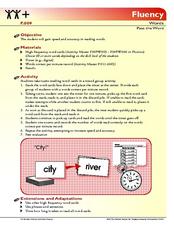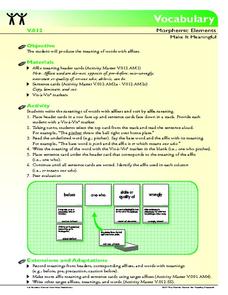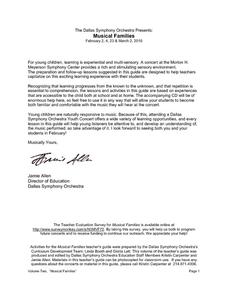Florida Center for Reading Research
Fluency: Words, Pass the Word
Learners time each other as they read as many high-frequency words as possible in one minute. Peers record progress.
Georgia Aquarium
The Ocean's Nursery
Linear perspective, estuaries, and water ways converge in a science-inspired art project. The class uses what they've learned about eco-systems, estuaries, and the food chain to create scale models of a local marsh. While the lesson...
National Geographic
Altitude: What's in the Air?
Introuduce your scientists to the differences in air at varying altitudes with a colorful explanatory graph. After some discussion, they view unbelievable footage of mountain-climbing Leo Houlding and a narrative about how he might do...
Florida Center for Reading Research
Vocabulary: Word Meaning, Inside Information
Support the acquisition of content area vocabulary with this foldable resource. With space for studying three new terms, pupils determine the definition, write a sentence, and provide examples for each word.
Florida Center for Reading Research
Vocabulary: Morphemic Elements, Make It Meaningful
Scholars learn to find meaning in words using affixes with a language arts activity. In pairs, children sort cards with printed sentences that include words with the prefixes mis- and pre- and the suffixes -er, -ness, and -able. Then,...
Florida Center for Reading Research
Vocabulary: Morphemic Elements, Root-O!
Young readers get to the root of unfamiliar vocabulary with a collaborative learning activity. Given a deck of root word cards and copies of a graphic organizer, pairs of students take turns flipping over cards and brainstorming...
Florida Center for Reading Research
Vocabulary: Words in Context, Meaning Maker
Support children with finding meaning in unknown words using this graphic organizer. While reading a piece of writing, learners identify unfamiliar words, using context clues and reference materials to find and record definitions before...
Florida Center for Reading Research
Vocabulary: Words in Context, Ask-Explain-List
Engage young readers in using context clues with this collaborative vocabulary activity. In pairs, children draw from a deck of cards, with each card asking a question about a context involving a specific vocabulary word. After...
Florida Center for Reading Research
Vocabulary: Word Meaning: Know or No
Activate the prior knowledge of young scholars as they expand their vocabulary with this language arts activity. Given a deck of cards containing new vocabulary words, learners sort them into four categories, from Don't know the meaning...
Dallas Symphony Orchestra
Musical Families
Planning a trip to the symphony? Prepare first-time attendees for the experience with overheads that identify the roles played by the concertmaster, conductor, musicians, and even the audience. The musical families are introduced...
Federal Reserve Bank
Measuring the Great Depression
Young historians examine the cost of goods and services through the Consumer Price Index (CPI), output measured by Gross Domestic Product (GDP), and unemployment measured by the unemployment rate to gain an understanding of the economic...
Federal Reserve Bank
What Really Caused the Great Depression?
Falling wages. Rising unemployment. Falling prices. Sound familiar? Young economists look at the role the US banking system had in causing the Great Depression.
Federal Reserve Bank
What Do People Say?
After reading a series of fictitious letters that represent actual events during the time period, young historians craft a small town newsletter to explain the causes of the Great Depression.
Creative Learning Exchange
The Infection Game: The Shape of Change
Encourage the spread of knowledge in your class with this cross-curricular epidemic simulation. Pulling together science, social studies, and math, this lesson engages students in modeling the spread of infectious...
King Country
Lesson 3: Relationships - Day 1: Self-Esteem
A sense of belonging, of being capable, of being appreciated, and the role these feelings have in our self-esteem is the subject of the third lesson plan in a family life and sexual health unit.
King Country
Lesson 26: HIV/AIDS & Other STDs - Day 3: HIV/AIDS
The third lesson in the three-part series on HIV/AIDS and other STDs considers how these diseases are passed, how to protect against them, and risky and safe behaviors. The discussion of condom use and sexual behaviors are explicit.
Other popular searches
- Education News
- Media Education Propaganda
- Media Education Esl
- Lesson on Media Education
- On Line Media Education
- Media Education Lesson Plans
- Media Education Tabloid
- Online Media Education
- Media Education Math
- Media Education Blogging
- Media Education Art Projects
- Media Education Blagging

















